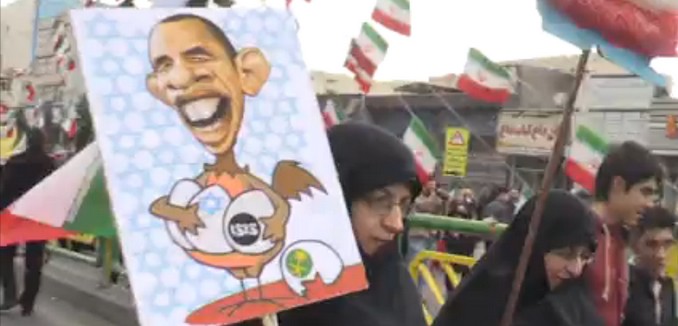Tens of thousands of Iranians celebrated the anniversary of the 1979 Islamic Revolution on Thursday by marching in Tehran and chanting “Death to America and Israel.”
Judging by the tone of the celebrations, “if you thought anti-American sentiment in Iran had waned after the nuclear deal and the lifting of sanctions, you could be wrong,” NBC News reported. “I am happy that I was able to come here today, and as an Iranian I can put my fist in America’s mouth and say Death to America,” 22-year-old Sanaz told NBC.
The celebrations featured several commemorations of last month’s capture and detention of ten American sailors. Iranian state television broadcast a video Wednesday showing one of the captured sailors crying. Rear Admiral Ali Javadi, the commander of the Islamic Revolutionary Guard Corps navy, said last week that Iran possesses additional footage of the American sailors that would bring “humiliation” to the U.S. and make American officials “100 times more embarrassed” if released.
Very disturbing photos from #Iran today – they're celebrating "Islamic Victory" by reenacting capture of US sailors pic.twitter.com/w6CQ4Gug3J
— Peter Roskam (@PeterRoskam) February 11, 2016
Iranian President Hassan Rouhani told the crowd that Iran would “never yield” to outside pressure, and that “our nuclear victory showed to the world that Iranians are capable of winning any battle, including diplomatic battles.”
Other Iranian officials celebrated Iran’s “scientific and defensive achievements,” including the Emad ballistic missile. Iran tested the Emad in October, which the United Nations ruled a few months later was a violation of UN Security Council Resolution 1929. Iran’s semi-official Fars news agency claimed that such tests reinforced Iran’s interpretation of Security Council Resolution 2231, which formalizes parts of the nuclear deal. That resolution also calls for Iran to refrain from testing ballistic missiles, but Rouhani said that his country was unwilling to “abide by any resolution” that would limit its capacity to develop or acquire the weapons it deemed necessary.
Based on the UN’s finding, the United States imposed sanctions on Iran for its ballistic missile program in January, after announcing the end of nuclear-related sanctions. The U.S. had originally planned to impose the sanctions, described by an expert as the “bare minimum,” at the end of December, but delayed imposing them due to pressure from Iran.
The New York Times reported in November that official anti-American activity was becoming more prevalent in Iran in the wake of the nuclear deal. Anti-Defamation League national director Jonathan Greenblatt observed a month later that Tehran’s anti-American policies, which led to the recent arrest of an American citizen and a U.S. resident, the sentencing of an American journalist to jail, and a surge of cyber-attacks against U.S. officials, have intensified along with Khamenei’s rhetoric.
In This Is Not What a “Moderating” Iran Looks Like in the Wake of the Nuclear Deal, which was published in the February 2016 issue of The Tower Magazine, David Patrikarakos observed that the arrests of Americans by Iranian security forces were blunt messages by Ayatollah Ali Khamenei to the United States that, having compromised on the nuclear deal, Iran would show no more signs of weakness.
[Photo: NBC News ]




